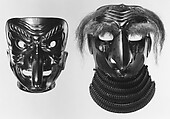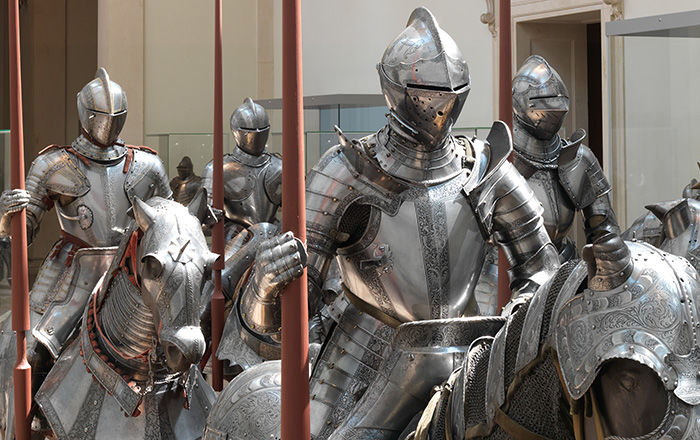Mask (Sōmen) Representing a Tengu
Not on view
A mask that covers the entire face, known as a sōmen, is a dramatic feature of Japanese armor of the Edo period. Various types of simpler armored masks, usually protecting only part of the face, had been developed for practical use during the more violent Muromachi period (1333–1573). Masks embossed with human features are thought to have been made as early as the fifteenth century. However, during the Edo period armorers gave free rein to their imaginations––as they did when making representational helmets––and created masks in forms ranging from fierce gods to comical folk characters.
This sōmen vividly portrays the face of a tengu, the embodiment of powerful and usually malevolent spirits who, in Japanese folk beliefs, inhabit the woodlands of high mountains. There are two principal forms of tengu: the Karasu Tengu and the Ko no ha Tengu. They are typically represented as having human bodies, wings, and sometimes talons in place of hands and feet. The Karasu Tengu has a birdlike head complete with a strong, sharp beak. The Ko no ha Tengu has a human face, distorted by an enormously long nose. This mask representing the Karasu Tengu is made of leather, embossed and lacquered to simulate iron, and trimmed with hair. It can be worn in three configurations: as a full face mask sōmen,/i>, with the brow piece removed (mempō), or with the brow and the beak removed (hōate).
The tengu have had a long and varied history, throughout which their attributes and cultural significance have continued to evolve. First mentioned in Japanese literature in the tenth century, tengu are featured in a vast number of legends and folktales. They are credited with many powers, including supernatural strength and the ability to fly, to assume other forms, and to take over humans through possession. One of their main aims is the subversion of Buddhism. Tengu plague people by abducting children for short periods, by burning down temples and houses, and by assaulting those who enter or in any way profane their sanctuaries. Occasionally, however, tengu appear as benevolent spirits who protect certain individuals or temples.
Particularly pertinent in reference to this mask is the desire ot the tengy to cause war, by possessing men and inciting them to fight or by appearing on the battlefield themselves. Tengu are considered to be masters in the use of all types of weapons, able to defeat all but a few of the mortals who dare to oppose them in a trial of arms. They are also closely associated with the yamabushi, mountain-dwelling monks known for their martial prowess, whose guise the tengu frequently assume.
Due to rights restrictions, this image cannot be enlarged, viewed at full screen, or downloaded.

